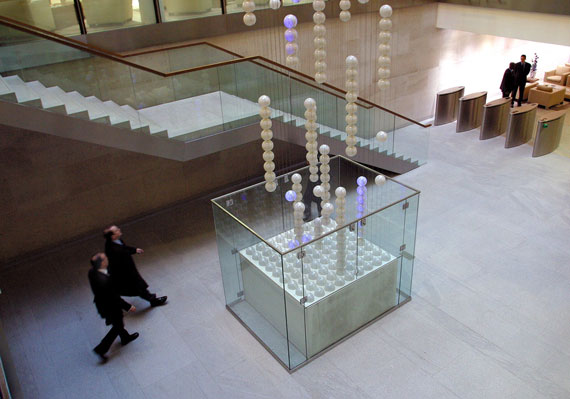
(Bloomberg) — The venerable London Stock Exchange is going to switch the lights off at midday March 21 in the name of liquidity.
Don’t worry — hard-pressed traders are not downing tools to grab a pint. The bourse is instead hitting the pause button for two minutes, ushering in for the first time an intraday auction process in which orders are entered but not automatically executed. The market will effectively go dark, or at least dimly lit, concealing individual buy and sell orders and potentially allowing big trades to go under the radar. When the lights go back on and regular trading resumes, buyers and sellers will be matched and prices will move as before.
The Top Dark Pools as Ranked by FINRA.
It’s a measure that makes sense if you consider it a weapon in the war for investors’ hearts and minds in the post-“Flash Boys” era. Money managers trading big blocks of shares have tended to prefer the precious privacy of dark pools — operated by a variety of actors, from investment banks to incumbent exchanges –to the visibility of traditional “lit” markets.
But ata time when suspicion and scrutiny of those dark pools is growing, LSE is betting that it will be able to take back market share with an auction that offers privacy without completely sacrificing transparency (basic data on best bid and offer prices will be available and full data on individual orders will be restored once the auction ends). And if European regulators go ahead with their proposed plan to limit dark-pool trading from 2017 under MIFID II rules, the LSE’s new auction will look ahead of the curve.
Although a change to the trading day does not come without risks — electronic trading algorithms will have to be re-tooled and the auction may add to intra-day volatility — it’s an experiment that’s certainly worth trying. Any event that concentrates trading liquidity and volumes will be seen as a boon by investors whilemarket rules and structures are becoming more complex; the LSE itself will also want to maximize market share whileit’s being courted for a takeover by Deutsche Boerse.
Don’t go expecting an explosion in volumes or fees as a result, though. Total U.K. trading value on the LSE has fallen in recent years, even as volumes have rebounded. That’s a function of the diminished volatility in a low-interest-rate world, but also increased competition: the LSE’s market share in FTSE 100 stocks today stands at around 59 percent, versus around 24 percent for Bats Europe, according to data from Fidessa. Including LSE’s dark-pool unit Turquoise takes the company’s market share up to 75 percent. While that’s still a sizable chunk, its a far cry from its near-total domination when Bats Europe came into existence in 2008.
But if offering new ways to trade big blocks is certainly one way of luring investors, it’s not something unique to the LSE. Bats Europe is also offering intraday auctionsalongside the regular trading day. Deutsche Boerse alreadyruns a lunchtime auction in Germany, where they’re more common.
It’s a sign of how new regulation and increased competition have pushed the industry away from meeting theneeds ofhigh- speed electronic traders and more towards better connecting big pools of capital. Fund managers, who are relative newcomers to worries about liquidity and transparency, are succeeding in making their demands heard. That’s forcingall exchanges to respond or face a loss of market share.
LSE’slunchtime switch was about threeyears in the making, and it’s a matter of better late than never, rather than a brave new push into a game-changing profit-spinner. In the end, a marriage with Deutsche Boerse may do far more for LSE’s pricing potential and market share than Monday’s measure.
The views expressed in the op-ed do not reflect those of the editors of Traders.




